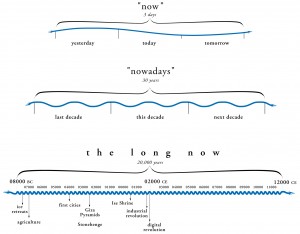Picking up on the commentary in the previous post, much of today’s discussion focused on temporality, and specifically on the following themes:
(1) Acceleration
We discussed the acceleration of time in the era of industrial/technological capitalism, computerization, and all that, as well as responses (artistic, intellectual) to that acceleration.
An image that goes with acceleration is the “hockey-stick curve” made famous by climatologists (and their critics). It, or something like it, features not only in climate science, but in population biology (the human population growth curve), accounts of globalization, access to technology (there are 1.3 billion users of facebook), cyberpunk and related fantasies about technological singularity, and elsewhere. And it’s been a longstanding theme in artistic and political discourses, going back at least to the Futurists and reappearing (this time in a left-wing guise) among the Accelerationists.
(2) The Now
There is the present — and the present-centeredness of so much Anthropocen(e)(tric) discourse — and there are efforts to expand it, for instance, through concepts of the “Long Now,” which covers the last 10,000 years or so and is intended to get us to think about the next 10,000.
And while the “Long Now” is intended to counteract acceleration(ism), one of us questioned whether it’s anything more than just a coping mechanism or apparatus of capture. It still tethers us to the present, but with only a bigger terrain to siphon into that present. Clark seems to want to break out of that present-centeredness altogether — toward the earth as a fully autonomous entity, beyond anything we could possibly capture or comprehend.
We discussed alternative datings that might scramble our present-centeredness: the dating of history, after all, remains marked by the event of a messiah (B.C.–A.D.) whose messianism is not accepted by the majority of the world. Alternative Year Zeros might be the 1950s (the baseline for radiocarbon dating), or 1826 (the beginning of the photographic — and later the audiographic — archiving of bits of reality). And “matrix” theories of reality (are we living in a simulation?).
(3) The point of tension/irresolution
We left off on the thought that Clark’s project is attempting to serve as a counterpoint to anthropocentric discourses of time, the Now, the Anthropocene, and so on, and that this is what makes it valuable. But does it underrate other philosophical positions in order to make its point? And, perhaps more importantly, have scientists not been doing precisely what Clark calls for — looking to the autonomous Earth — all along, which would render his argument moot for them and only of interest to fellow social theorists?
I pointed out that science has always been characterized by this tension between two orientations: (1) the “outward gaze” — looking out to the universe, down into the geological past, deep into the cellular and subatomic worlds, and so on, for the sheer sake of opening up to that which has always eluded us — and (2) the very present-centered “project” of science as Enlightenment, the shedding of superstition and the makeover of the world by us and for us (and, as it turns out, more and more of us).
The first is, after all, what the second stakes its claims on: Science delivers capital-t Truth (#2) because it looks at the World with a clear, direct, methodical, and unemotional gaze (#1). Latour’s project is to separate these two claims and to rebuild science’s authority on the details of what it does, not on the claims it makes.
Perhaps Clark is aiming at something like this, but not a de/reconstruction of science so much as it is a de/reconstruction of the human: that it is in counterpoising human power with human vulnerability — vulnerability in the face of this mysterium tremendum of an inhuman and ultimately unfathomable earth — that we can find our own bearings for being human again?
For next week
We will read chapter 2 of Inhuman Nature and peruse our own selection of 4 to 5 chapters/sections of Making the Geological Now. We’ll then write and share a response to one of those chapters/sections.


Excellent discussion today!. Very much looking forward to next week…
For a bit more background on the simulation argument, here’s a link to Nick Bostrom’s “Are you living in a computer simulation?”
http://www.simulation-argument.com/simulation.html
Harlan